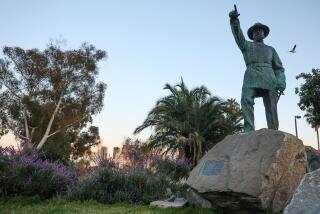State’s Chinese Recall Titan and Tyrant
- Share via
From the office suites of Monterey Park to the holiday-festooned streets of San Francisco’s Chinatown, word of the death of Chinese senior leader Deng Xiaoping reverberated with the impact of a titan felled.
There may have been little surprise--he had been sick so long, after all--but Deng’s death evoked throughout California’s vast Chinese community the sort of talk reserved for the truly awesome forces of history. Admirers credited him with prodding his nation toward modernity by opening it to the ways--and the commerce--of the West. Critics recalled him as the author of the infamous Tiananmen Square crackdown and the last craggy soldier of China’s repressive old guard.
“It signifies the end of the old last era--the last generation that was against democracy,” said Marina Tse, a Duarte schoolteacher active in the San Gabriel Valley’s Chinese American community. “I’ve been thinking: How long do we have to wait for him to be gone for things to move on?”
Orange County’s Vietnamese community reacted with sadness over the news.
Yen Do, publisher of Nguoi Viet Daily News in Westminster, said Deng’s death had been anticipated as reports of his failing health circulated internationally. He described the announcement as “emotional news” for Vietnamese in Orange County.
“We share a lot of the same civilization and a lot of common history in the last half of this century,” Do said. Despite military actions between the two countries in 1979--China attacked Vietnam’s northern border in retaliation for Vietnam’s invasion of Cambodia--Deng was “a great friend of the Vietnamese people,” Do said.
He said it’s too soon to tell what effect Deng’s death will have on Chinese-Vietnamese relations.
“I don’t think any big change will happen quickly,” he said.
Mai Cong, president and chief executive officer of Vietnamese Community of Orange County Inc., agreed, adding that she is hoping for a smooth transition of power.
“Otherwise, there will be a lot of unpredictability,” she said. “Deng was in power for so long, he had a profound impact on Chinese policies. No one can predict what will happen, unless it’s his people” who retain power.
Deng’s death prompted concern about the future of China’s burgeoning trade ties with the West, including among many business people in Southern California who have looked to China as a land of opportunity. But most local observers said the ailing Deng had already been moved to the sidelines and predicted China was unlikely now to reverse the course he set.
“I don’t think they can stop the open-door policy,” said David H. Ma, a Monterey Park consultant who has advised Chinese officials hoping to do business in the United States.
Across a spectrum of ideology, local Chinese Americans of many walks of life praised Deng as a forceful visionary who tugged a closed society toward the modern age. “His contributions to the economic development of China are unmatched in history. . . . He lifted 200 million people out of poverty,” said historian L. Ling-chi Wang, a Chinese American professor at UC Berkeley.
Wang credited Deng with defining a closer relationship between China and the United States in 1979 and managing to survive repeated purges. “He was a survivor--sort of like Nixon,” Wang said.
Nancy Yee, executive director of the Chinese Chamber of Commerce in Los Angeles’ Chinatown, said of the late “paramount leader”: “He was a great man. He lifted the iron curtain and opened China to the world.”
Even some who have clashed with the heavy-handed methods of Deng’s government managed praise for his role in history.
UC Berkeley Chancellor Chang-Lin Tien, who has met Deng several times, said he wrote a protest letter to him after Chinese troops cracked down on pro-democracy demonstrators in Tiananmen Square, causing what many now estimate to have been 1,000 or more deaths. Tien refused to visit China for five years after that, but he called Deng “a major thinker in the modern history of China.”
People of Chinese ancestry make up the largest Asian group in the nation and about half--or nearly 800,000--live in California, mostly in Los Angeles and San Francisco. California has the largest Chinese population outside Asia. Many are first-generation immigrants who pay close attention to what’s happening in their ancestral land.
In San Francisco’s Chinatown, the oldest such enclave in the United States, word of Deng’s death traveled slowly and held little surprise. The twin barriers of time and distance have dulled much of the reaction in the neighborhood, which was decked out for the second week of Chinese New Year events.
Asked about Deng, an older man of Chinese descent on Grant Avenue simply replied: “I’m American-born. We don’t think too much about it.” The Chinese leader’s death, he added, would probably have little effect on the land of his ancestors because “all the change has been made already.”
Times staff writers Maria La Ganga in San Francisco and Scott Martelle in Orange County contributed to this report.
More to Read
Sign up for Essential California
The most important California stories and recommendations in your inbox every morning.
You may occasionally receive promotional content from the Los Angeles Times.









